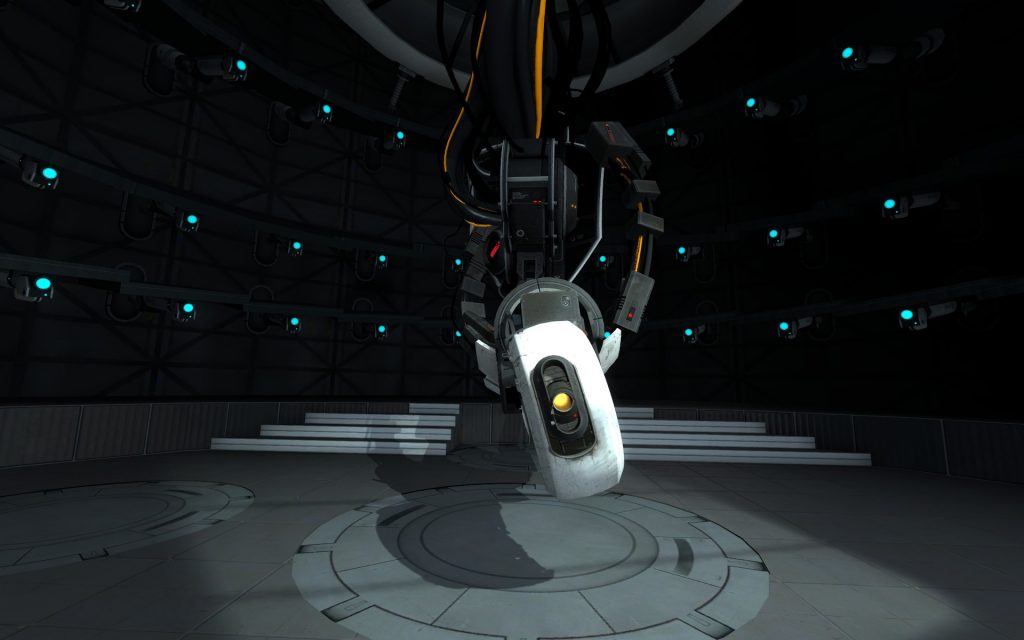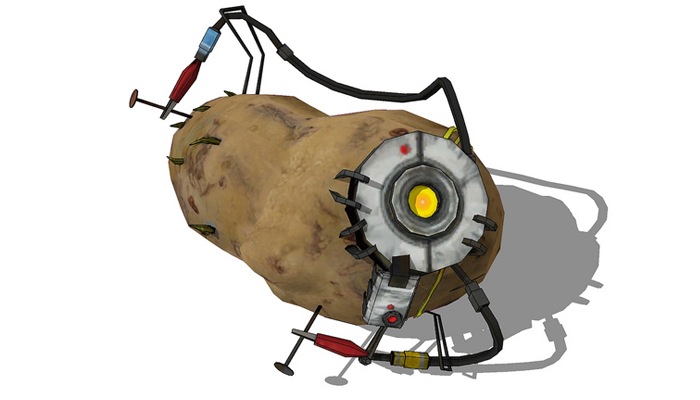The Women that Gaming got Right is an ongoing series looking at the best female characters that gaming has to offer. 99% of the time video games represent women pretty poorly – this isn’t about shaming the 99%, but celebrating the 1% in the hopes of encouraging better from the industry. The best female characters aren’t over-sexualized, aren’t solely reliant on men, have their own goals and ambitions, act rather than just react, and more. I’ll be looking at a new character in each piece, and will consider their design, voice acting, writing, plot role, and relations to men. None of them are likely to be perfect, and I’ll discuss the flaws in their characterizations, but each is broadly successful, and worthy of emulation and praise.
GLaDOS
Portal is GLaDOS. Forget the inventive gameplay concept, minimalist aesthetic, and even the companion cube. Without GLaDOS, Portal wouldn’t have been even half the game that it was, nor half as popular. The delicately paced revelation that GLaDOS was far more than a series of pre-recorded messages or a helpful bit of lab software is what elevated the original title from a simple puzzle game into much more, and her endlessly quotable lines have proven far more memorable than any test chamber. And that’s not even mentioning ‘Still Alive’ – surely a contender for the best song in gaming’s history.
Portal 2, of which I’ve already raved in the past, then goes and does the impossible: it makes her just as cruel, manipulative and vindictive, but somehow sympathetic too. The writers, together with voice actress Ellen McClane show us the world from GLaDOS’s perspective, coupled with a simple, yet touching, back story. They elevated the AI from merely being one of the best and most original villains around into a fleshed out character, one we could even – sometimes at least – relate to.

The Look
GLaDOS, being for the most part disembodied, has a bit of an advantage here, as the player only rarely sees anything that you might call her body. For those scenes that do include a physical form however, Valve deftly avoided the ‘sexbot’ trap (see EDI from Mass Effect 3) and kept GLaDOS firmly inhuman. Maybe there’s someone out there who finds the assortment of cables and computer spheres particularly titillating, but they’re probably in the minority, and I’m pretty sure it’s not what the designers had in mind. Full points here.
The Character
GLaDOS is witty, sarcastic, biting, and cruel. She doesn’t flirt, she’s not demure, she has no interest in pleasing the player or stroking their ego, and yet she also isn’t surly or masculine. That’s most of the major tropes and stereotypes avoided then. In fact, she’s a refreshingky genderless character – I suspect that much of her dialogue could simply be re-recorded by a man with very few changes.
She’s also a complex character, one that it takes at least a little work to understand. She’s not evil per se, and in fact she pretty much just wants to be left alone to test – she just has a slightly warped understanding of the scientific method. She is arrogant however, and with a hefty ego – traits typically left to male characters, who tend to be more closely linked to work and achievements, and this is at the core of what makes her such an excellent villain.

The Gameplay
GLaDOS isn’t the protagonist – although that would be one h*** of a spinoff – and actually has rather minimal immediate effect on gameplay. She sets up the test chambers in the first game and part of the second, leading players through them, but that’s just her as a stand in for the developers. She only directly interacts with the player in the boss fight that concludes Portal, where she basically just hangs from the ceiling shooting rockets at you. Again, the fact that she’s female – or at least voiced by a woman – had no obvious effect on the gameplay design.
The Plot
GLaDOS drives the entire plot of the first Portal, guiding the player through the test chambers and slowly revealing her true nature. It was her actions that set the plot in motion, and it’s she that moves the plot forwards until the player starts to drive things at the end. She’s less central to the sequel, where Wheatley begins to take center stage, but even there, she’s undeniably a key player. I suppose someone might rather uncharitably argue that she becomes a damsel in distress (or potato in distress?), but that seems a little unfair, and it’s certainly not a typical damsel in distress plot.
The Relationships
Another area where GLaDOS excels. She’s no one’s daughter, sister, girlfriend or wife, and is certainly not a romantic interest for the player character (though I’m sure someone on DeviantArt has tried to fix that). Her sole relationship to the player is pretty much just hating you and trying to kill you, which is alright really. She is of course revealed to have been (in a roundabout way) Cave Johnson’s assistant, which I suppose isn’t super progressive, but does at least suit the time period – and Cave – so I’ll let it slide.
Conclusion
GLaDOS deftly avoids just about every negative trope or stereotype out there about female characters. She’s not sexualized, she’s not passive, she’s not defined by her relationships with men, she has her own goals, and so on. Basically, she’s great. Now, of course, much of that comes because she’s an AI and not a human, but there are plenty of ways it still could have gone wrong. The aforementioned EDI from Mass Effect 3 is a great example of how not to do a female AI (at least in terms of design), and of course Valve could have made GLaDOS male, as I suspect most developers would have. But they didn’t, and thank god for that.

 …WOOLY DESERVES BETTER LOL!
…WOOLY DESERVES BETTER LOL!